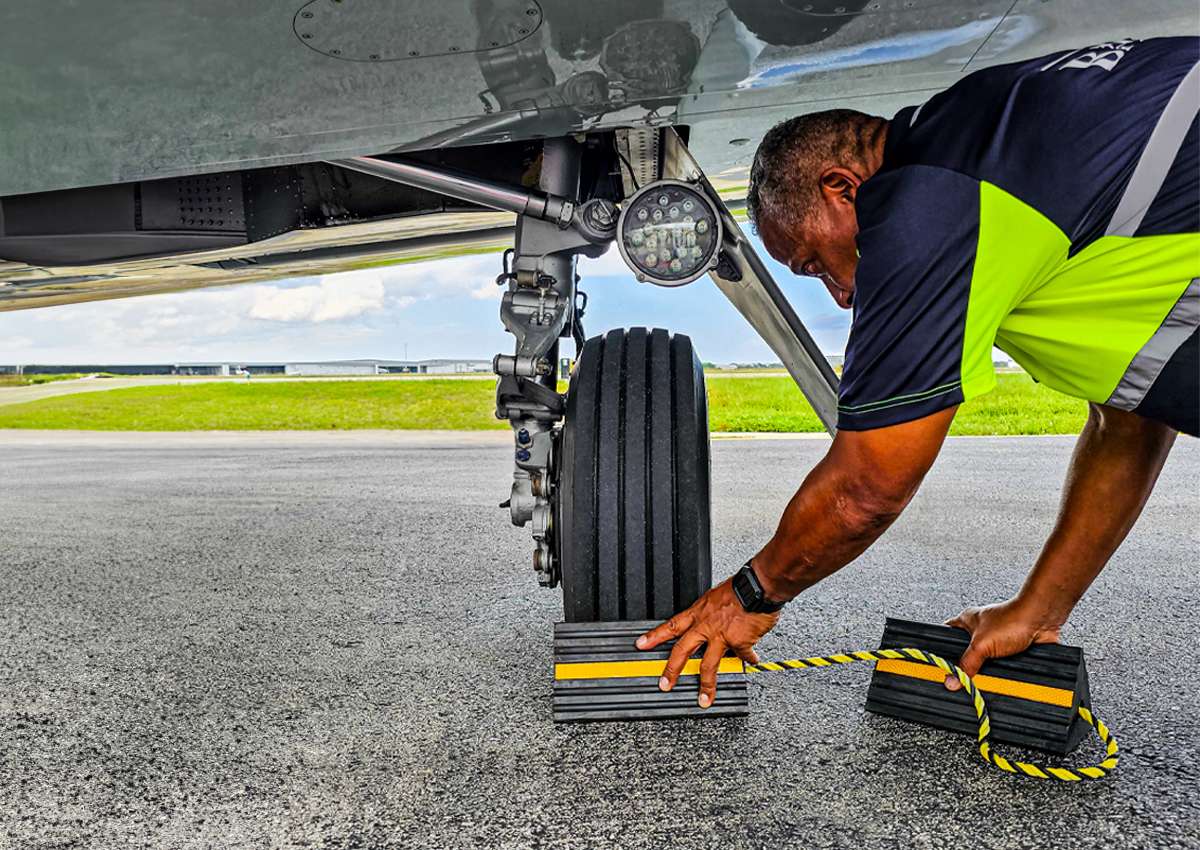For Fixed Base Operators (FBOs), safety, efficiency, and proper aircraft maintenance are crucial.
Two of the most important tools for ensuring aircraft safety on the ground are wheel chocks and pitot tube covers.
The Critical Role of Wheel Chocks
Wheel chocks prevent aircraft from rolling while parked for fueling, maintenance, boarding, or storage. Aircraft can move unintentionally due to wind, uneven surfaces, or vibrations from nearby equipment. For FBOs, wheel chocks are vital for ensuring aircraft stability and preventing accidents.
Best practices for chocking include:
- Chock both main wheels to cover the full width of the tires.
- Use two sets of chocks for dual-tire aircraft if one set isn’t wide enough.
- Triple-chock larger aircraft or those left overnight, especially in high winds, for added stability.
- Use rubber chocks for better grip and durability, and inspect wooden chocks for damage before use.
Why FBOs Should Never Skip Pitot Tube Covers
Pitot tubes measure airspeed and provide critical flight data, but they are vulnerable to debris, moisture, and insects when the aircraft is on the ground. If obstructed, pitot tubes can provide inaccurate airspeed readings, which can lead to flight safety issues.
A pitot tube cover prevents dirt, moisture, and debris from obstructing airflow, ensuring the instrument remains clean and functional. For FBOs, it’s essential to ensure every aircraft has a pitot tube cover before parking, safeguarding the aircraft’s instruments and ensuring accurate readings during flight.
Advantages of Wheel Chocks and Pitot Tube Covers
Using wheel chocks and pitot tube covers provides several key benefits:
- Increased Safety: Chocks prevent aircraft from rolling, reducing the risk of accidents and damage. Pitot tube covers protect sensitive instruments from blockages that could affect airspeed readings.
- Operational Efficiency: These tools reduce downtime by ensuring aircraft are stable and instruments are protected, improving turnaround time and operational flow.
- Cost Savings: Preventing damage to aircraft and instruments through proper chocking and covering reduces the need for costly repairs and ensures aircraft are ready for flight without delays.
Why FBOs Should Invest in Quality Tools
Investing in high-quality wheel chocks and pitot tube covers is a smart choice for FBOs. These tools are more durable, perform reliably under challenging conditions, and foster a safer environment for aircraft and personnel. Prioritizing quality over cheaper alternatives ensures long-term reliability and minimizes the risk of costly incidents.
Conclusion
While wheel chocks and pitot tube covers may seem like simple tools, they are essential for maintaining aircraft safety and readiness. These tools are crucial in securing aircraft, protecting instruments, and ensuring safe, efficient operations. Investing in quality chocks and covers is not only about improving efficiency—it’s about protecting aircraft, crew, and passengers, and maintaining high standards of service and safety.
Stay proactive. Stay safe. And always ensure your aircraft is in top condition with wheel chocks and pitot tube covers.



Share:
The Importance of Communication for Fixed Base Operators (FBOs)
A Guide for Operations Managers: Best Practices for Safety Management at FBOs